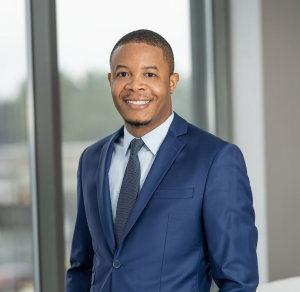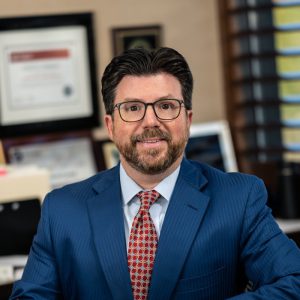By Hope Keller
It was 2002, the day before elementary school graduation in Clarendon Parish, Jamaica, and the students were excited. Several boys kept throwing water balloons at each other, though the teacher told them to stop. When they didn’t, she approached with an upraised ruler and drew it back to swing – and caught Jermaine in the eye.

“At that time in Jamaica, the teachers were allowed to whip the kids,” says Haughton, J.D. ’15, who remembers graduating first in his class with his left eye swollen shut. “I got to thinking: ‘Man, this is terrible. You know what, what if we sued the school board for allowing teachers to even hit students?’”
He laughs. “I don’t even know where that thought came from,” he says. “I didn’t know about suing anybody. But that got me into thinking more about the legal system and being a lawyer.”
Today, Haughton is a medical malpractice attorney with Wais, Vogelstein, Forman, Koch & Norman in Baltimore, specializing in birth-injury malpractice cases. He has recovered more than $25 million for his clients in the past five years.
Haughton didn’t gravitate to plaintiffs’ law straight out of law school. He first spent several years at Miles & Stockbridge and Nelson Mullins Riley & Scarborough before realizing that he wanted to assume more responsibility for cases.
“It might be a little precocious, but I wanted the pressure of taking a high-stakes deposition, not just doing document reviews, research and outlines,” he says. “I thought at a smaller firm they might have no choice but to put me in the game. And at a smaller firm, there are more opportunities to have hands-on work and to learn more closely from folks who are not under the gun of the big-firm time billing requirements.”
Haughton has handled several birth-injury and other med-mal cases so far, the majority of which settled for multiple millions of dollars.
“This person will never know what it means to have a normal life,” he says of a child born with a birth injury. “That really fuels me to be up at 2 a.m. on Friday and Saturday and Sunday, looking at every word in the medical record. I had a case that had over 30,000 pages of medical records, and I knew that record cold because I was so passionate about what had happened to that baby.”
He emphasizes the high-stakes nature of the job: “You’re a non-doctor, you have no medical training, and you’re taking a deposition from the head of obstetrics at some major hospital. And your job is to tell them that they’re wrong about some key thing. You can’t be fumbling around. You better know your record. If they said Mom’s blood pressure was 140/90, I can’t skip 15,000 pages to find it. I have to be able to say, ‘No, it was 180/101.’”
Haughton says he first fully grasped the importance of developing and trusting his own judgment when he worked in the Saul Ewing Civil Advocacy Clinic, under Venable Professor of Law Michele Gilman and Prof. Dan Hatcher.
“I remember being so frustrated, because every time I went to Michele Gilman and asked her what to do or what to think, she would tell me to go and read the rule and find out what the cases say. I asked her for a meeting and said, ‘You know, Professor Gilman, I love this class, but if this is so important to help these people, why can’t you just tell me what to do?’ She smiled at me. She saw my frustration. She said: ‘Well, you want to be a lawyer, don’t you? If you want to be a lawyer, that requires your own judgment.’”

Haughton’s direct boss, Keith Forman, J.D. ’06, said Haughton has attributes that are rare in younger attorneys.
“He just has a wonderful self-awareness of needing to listen to the other side of the story, to someone else’s point of view, and assimilating it into the decision-making processes at all levels,” Forman says, adding that he wishes he could “pump that into” every young lawyer he works with.
Haughton credits his father, Donnovan Haughton, for giving him the chance to come to the United States at age 15 and to get the education that has seen him to where he is today.
“If it wasn’t for him, none of it would have happened,” says Haughton, who, with his wife, Shahrazad Abdelmeguid Haughton, J.D. ’16, has a 5-year-old son, Jaiden.
Hope Keller is a writer based in Connecticut.
